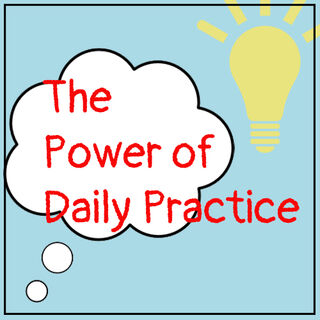Cognition
The Simpler Your Daily Practice, the Better
Keeping your daily practice clutter-free is the secret to its power.
Posted September 6, 2020 Reviewed by Matt Huston

This post is part six of a series on the psychological and practical benefits of daily practice. In this series, I explore the elements of daily practice, varieties of daily practice, challenges to daily practice, and strategies for meeting those challenges. Complete information can be found in The Power of Daily Practice.
In my experience, the simpler your daily practice, the more powerful your daily practice; and the more likely it is that you’ll maintain it over time. One reason that it ought to be kept simple is that if there is even a whiff of difficulty or complexity attached, it becomes really hard to crack through everyday resistance and get to your practice.
You wake up. Maybe you’re going to write and maybe you’re not going to write. On one side of the ledger is your desire to write. On the other side are all of your bad feelings about your current book. Those bad feelings produce a heaviness that as likely as not will prevent you from writing. If, however, you have a simple daily practice in place that begins with a super-simple mantra like “I write every day,” you’ve increased your chances of writing on that day, even as heavy as you feel.
If you feel heavy and if you also have to face a complicated practice with lots of demands (a thousand words every day, damn it!) and lots of moving parts (is the temperature 68 degrees, is the light coming in from the east, has the rooster next door crowed three times?), that combination of emotional heaviness combined with practice heaviness is a recipe for a writing day skipped.
This simplicity is both a cognitive sort of thing and a felt sort of thing. As a cognition, it might be as simple as “I’m off to my practice” or “Time to practice” or “Here I go!” As a felt sort of thing, it is the same body lightness that comes when you anticipate something being easy. It’s like a sigh and a smile rather than a groan and a frown. It’s like a pillow rather than a rock. Picture something being really easy. Picturing it? Feel the ease in your body?
You might combine these two ideas, of simplicity and ease, into the following ceremonial mantra: “I’m feeling light and I’m off to practice.” Imagine how lovely it would be if every day you were able to say, “I’m feeling light and I’m off to practice.” Can you remember the childlike simplicity of running out the door to play? There was nothing in the world simpler or easier. Be as easy as you can be and keep your daily practice as simple as is humanly possible.
Remember that we’re talking about your practice and not the content of your practice. The content of your practice may be very complicated. Maybe you’re working on a hard problem in physics or a hard problem in the app you’re creating. Your practice can still be blissfully simple. Even if the book you’re writing is challenging, your practice can still be simple. Even if the mathematical problem you’re trying to solve is knotty, your practice can still be simple. Keep this important distinction in mind.
Robert, a workshop participant, explained: “I got very excited about the idea of a life purpose practice where every day I would look at my list of life purpose choices and decide which one or two I was absolutely going to get to on that day. If I’d kept it that simple, it would have been a beautiful thing! But for some reason I had to overlay it with all sorts of demands: that I prioritize my life purpose choices, that I tackle at least one from my top three choices every day, that I spend an equal amount of time on each life purpose choice so as not to shortchange any, and 15 other demands.
“It started to feel like the worst kind of job imaginable! I had to chuck that whole way of looking at my practice out the window and return to the beautifully simple starting place: looking at my list each morning and making a choice or two. Period. That made all the difference! It turned a chore into a light thing.”
Sandy, a client, explained: “I had a hard time defining my practice. I wanted to write, I wanted to paint, I had health issues I knew needed addressing, I was craving a spiritual practice or maybe something like a meaning-making practice … I couldn’t make up my mind what my practice was ‘really about.’ So, of course, I never started it and I never engaged with it.
“It wasn’t working trying to decide what was most important. Each thing was important in its own way. I was about to throw in the towel and then I had an inspiration. I decided that I would take ‘simple’ to mean just showing up. I would just go to my designated daily practice space in the spare bedroom and do whatever needed doing on that day. I would just go there and stay put for an hour.
“That kind of made for a magical change. One day I would work on my nonfiction book. Another day I would research alternative health treatments. Another day I would sketch. I realized that it didn’t matter what I did—each thing had its own importance and its own resonance. My practice simplified itself to ‘I show up for an hour.’ And during the next two months I got a lot written, I created a new health regimen, and I made a lot of meaning, one hour at a time.”
Keep your daily practice simple. That’s a game-changer.
Eric Maisel is the author of The Power of Daily Practice. Learn more at ericmaisel.com.




